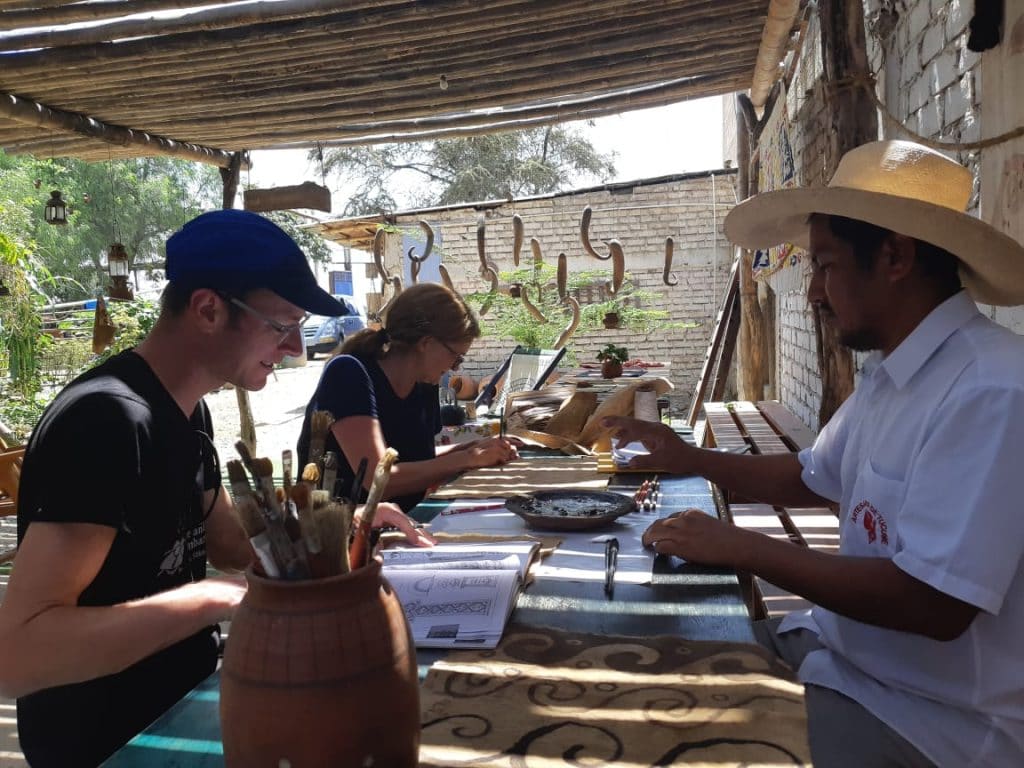Phima Voyages takes its engagement for sustainability very serious. As a travel agency, we believe it is our mission to create encounters between travelers and locals to make travelers discover Peru with all its facets and not only the archaeological sites.
In that respect we propose to our clients unique trips that can include several days in homestays, in total immersion in the Peruvian culture, or traditional activities that can easily be added to a more “classic” tour.
The advantage is on both sides:
- Local Peruvians can value their knowledge by sharing their customs and traditions through welcoming interested travelers. The money they earn will help them to improve their daily living conditions.
- Travelers will get an incredible insight in typical Peruvian lifestyle and get back home with fond memories.
How do we reach this goal of sustainability?
Sociocultural
On the sociocultural side, we meet the local communities and rural entrepreneurs to raise awareness regarding the fact that travelers are very interested in their traditions and lifestyle. Therefore, it is important to maintain their culture.
We also explain the importance of preserving the environment, just by continuing using their local practices and customs. Any motivated community or rural entrepreneur can participate in developing sustainability in tourism and preserving environment.
Phima Voyages then accompanies our local partners to open their homestay or to structure a traditional activity to be able to welcome visitors in their village. We propose our clients to spend several nights in a homestay in a community to discover their daily lifestyle or to participate in an agricultural or traditional activity. Sustainability is not just a word.
As an example, Phima offers a 2-hour activity in the small village of Leymebamba, where the travelers can experience the ancestral method of weaving, but also learn about the dying process and where the wool comes from.
Phima Voyages includes explicitly in its sustainable business practice that they strive for equal opportunities for all present and potential employees and therefore do not discriminate against anyone for their membership of or affiliation to any trade unions or political parties. Furthermore, all of our employees have a work contract that give them a social security. This work contract offers them a regular wage and two days off per week.
Ecological (part of sustainability)
Another important point of rural tourism is to respect humans and nature. That’s why Phima Voyages is committed to offer activities and excursion with a small ecological impact. All our hikes are accompanied by Peruvian guides (that might be English-speaking) who know the history and civilizations of their home country perfectly.
Hiking with a guide gives you the opportunity to learn much more about the environment and local plants. At the same time, it is a great way to give some ecological lessons about not going off the path and not leaving any trace behind you. Each client commits to protecting et respecting the ecosystem, by following the explanations and instructions of his guide.
Furthermore, for the clients traveling with a guide and a private driver throughout their trip, Phima Voyages offers them a reusable flask. The Peruvian water isn’t drinkable so instead of buying many plastic bottles, the customer can fill his flask from the big 22-l water bottle in the trunk of the car. Like this we reduce the plastic consumption and offer a useful gift to the clients.
In order to reduce the CO2 impact on air travel, Phima Voyages suggests its clients to only travel to Peru for a period of at least 15 days, even longer if possible.
In addition to having a sociocultural and ecologic impact, the tourism industry also has an economic and social impact in Peru.
Economic and social impact
Tourism industry is an essential sector for the economy of a country. Between January and April 2018, Peru welcomed more than 1 543 000 international visitors, which is 22% more visitors than last year. This trend for travel to South America is a great chance for Peru, as sustainable tourism is a development tool for the enhancement of cultural diversity, heritage and territory.
By traveling sustainably, the travelers look for encounters and experiences with the local habitants in their daily life. Traveling in remote communities helps to create an additional income for the people living there as well as new sources for employment and income.
Conclusion
Sustainable tourism growth values natural and cultural resources, helps to diversify the local economy, integrates women and fragile people, but also improves their daily quality of life.
Phima Voyages sees tourism as a new way to integrate women (e.g. in homestays) and to decrease gender inequality in rural areas. Therefore, we value the knowledge of the local women by offering workshops such as weaving, baking, or around coffee harvest and roast.
To conclude, the three principles of sustainability-responsibility: environmental, economic et sociocultural aspects, all depend on each other.
Together they ensure a healthy and sustainable balance.
Please find our detailed sustainability policy here.
For questions and remarks related to our sustainable development/CSR policies, please contact Martina Capel, Sustainability Coordinator of Phima Voyages by email at martina@phimavoyages.com.


